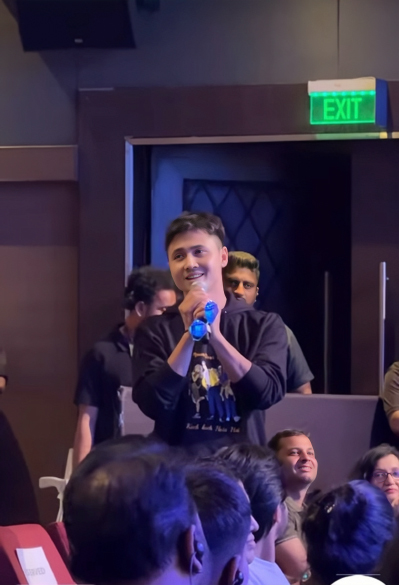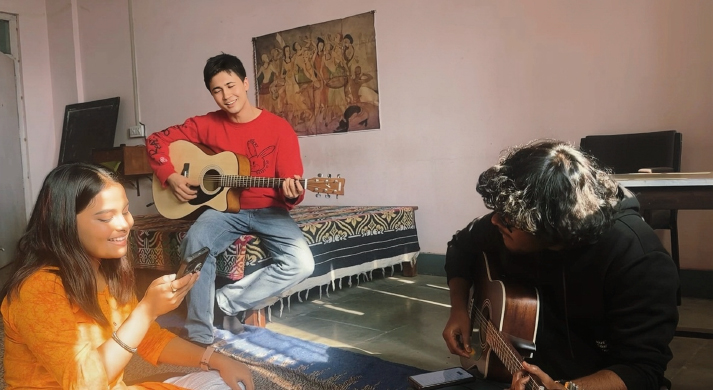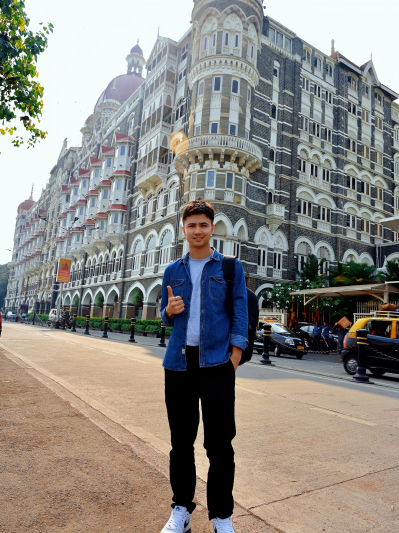| Xinjiang Today |
| From Kashi to Kolkata | |
|
|
 Airepati Abudurusuli sings at the private birthday party of Bollywood actor Shah Rukh Khan (COURTESY PHOTO)
Few would expect that a voice from the far west of China would echo through a ballroom filled with Bollywood film elites. Fewer still would guess the performer speaks in fluent Hindi and sings in the vocal style of Indian classical music. But this was what happened at the private birthday party of India's reigning cinema icon Shah Rukh Khan in November 2024, where a young Chinese fan hailing from Kashi (Kashgar) in China's Xinjiang Uygur Autonomous Region was invited to sing a song from one of the star's most iconic movies. The video of the boy singing drew tens of thousands of views on Instagram, where it was reposted by the actor's cricket team as well as his largest international fan community. The young man's name is Airepati Abudurusuli. Five years earlier, he caught a fleeting glimpse of Khan at Beijing Capital International Airport. This time, he stood only a short distance away, singing on behalf of the superstar's millions of Chinese fans. To the casual viewer, Airepati may seem to be the archetype of a devoted fan, one who had crossed borders and traveled thousands of miles for a brief encounter with his idol. But the story is much more complicated than that. Between the two encounters lay a journey marked by unexpected turns, tough grind and quiet struggles. Airepati himself said, "I came to India because of Shah Rukh Khan, not for Shah Rukh Khan." The distinction is subtle, but it points to much deeper motivations—and a path less trodden.  Airepati plays music with friends (COURTESY PHOTO)
The long way around Airepati's earliest dream was not to become a singer, but to act. And it was this aspiration that propelled him to take the yikao, the extremely competitive entrance exam to China's top art academies. The plan, unfortunately, did not go as he had wished. After failing the yikao, he shifted course and eventually enrolled at the Beijing University of Chemical Technology. That, however, did not stop him from pursuing a career in acting. Throughout his college years, Airepati kept showing up to casting calls and open auditions. He became an idol trainee at one point and took part in preliminary rounds for several televised talent shows. None of these led to the breakthrough he hoped for. With each setback came a growing sense of anxiety. And as graduation approached, so did uncertainties about the future. "I could feel myself slipping into something like depression," he recalled, adding that he would spend hours circling the campus track and listening to Hindi songs on repeat. "I've been listening to these songs since I was a small kid, and they have always had a way of pulling me through." It was around that time when he began uploading covers of Bollywood songs to social media. To his surprise, they found an audience. Airepati had always loved to sing. At school, he was a regular at art fests and live performances. But his parents had never supported the idea of music as a profession. The unexpected popularity of his Bollywood covers, however, made him reconsider: Perhaps this hobby, once set aside, could become something more. After graduation, Airepati returned to his hometown in the hope of turning his passion for Bollywood songs into a career. "In Xinjiang, people are more familiar with Indian cinema and music than in other parts of China and, unlike in Beijing, where I was on my own, I had support from family and friends here," he said. Yet reality, once again, fell short of his aspirations: It was easy to find an affordable recording studio in Beijing, but such services were unavailable in his hometown. Additionally, the tightknit community at home meant it was impossible for him to practice singing without disturbing others. With no steady income and little room for career growth, the symptoms of depression crept back in. It was during this stretch—when almost nothing seemed to be working—that the idea of studying abroad first occurred to him. The goal was simple: to find a new environment where he could start over—a place where he could invest more fully in music.  Airepati in front of the Taj Mahal Palace Hotel in Mumbai, India (COURTESY PHOTO)
Begin again For a time, the idea of studying abroad was little more than a vague ambition, until Airepati read about an arts scholarship offered by the Embassy of India in China. After months of waiting, a letter arrived from a music conservatory in India, which, having seen his Bollywood cover videos, offered him a full scholarship for three years. "It was then that I realized that no effort is wasted," Airepati said. "Those videos I paid to record, those covers that never made me a cent—they ended up opening a window when all the doors are closed." In late September 2024, Airepati finally arrived in India. What awaited him, however, was not what one would expect from a Bollywood movie—no song and dance routines, no easy triumphs, no happy accidents. Instead, he encountered the much harsher realities that come with integrating into a culture and way of life that was vastly different from his own. The first surprise came at the airport, where he was held at customs for over two hours. "Nobody believes a Chinese youth would come to India just to study traditional Hindi music," Airepati said. Language proved to be the steepest hurdle. In Kolkata, where Airepati was based, Bengali—not Hindi—is the dominant language, making both his studies and day-to-day life considerably more difficult. "All course instruction was in Bengali," Airepati recalled. "Lecture notes, teaching materials—everything. I could only note down the names of key musicians or songs and research them afterward." The classroom environment, too, was far from familiar. "We sat cross-legged on the floor, like in meditation. Shoes had to be left outside the classroom," he said. "This is the traditional way to study Indian classical music, which is all about respect for both the instructor and the art itself." His life in India was marked by a profound feeling of loneliness. "I was entirely on my own," Airepati noted. "Back in Beijing or Kashi, I had friends who can lend a helping hand. But here, I've had to handle everything by myself." In that solitude, his family—especially his younger brother—became his most important source of emotional support. Even today, Airepati can still remember a message his brother sent him after listening to his latest vocal practice recordings. "Your breath control is getting much better. It's clear that all the hard work is paying off," the message read. Besides his family, what also sustained him through that period was an unwavering belief in his own musical abilities. "I've always had faith in my talent," he said, adding that sometimes he would hear a particularly complex melody and, after just a few times, he could catch the subtle shifts in pitch. To give up, he added, would be to waste that gift—and to let himself down. "That sense of obligation to my own potential is what drives me," he said. Pitch perfect Five months into his new life in India, Airepati, having gradually settled into his new surroundings, turned his full attention to his musical studies. Indian classical music is an intricate art form that requires years of rigorous training. For beginners, this means repetitive and highly disciplined practice. "The vibrato in Indian classical music is unlike anything I've encountered," Airepati said. "It relies heavily on breath control and the ability to tell the subtle tonal nuances in Hindustani music." In addition to vocal training, he has also begun learning to play the harmonium, a keyboard instrument that is widely used in Indian classical music. "Learning the harmonium helps to train my ear," he said. "Pitch accuracy is taken extremely seriously in Indian music—every note in every raga must be sung precisely, and this takes a lot of practice." Despite the many hardships, Airepati discovered that his passion for Indian music has only grown deeper in its native setting. Equally rewarding were the many opportunities to share his own culture with a foreign audience. He was frequently invited to local concerts, where he was asked to perform Chinese songs. "There's something oddly moving about singing in Chinese in front of an Indian audience," he said. "Music really does transcend borders." Meanwhile, he has found a much wider audience online, where he has been chronicling his studies and daily life in India. "Many people who watch my videos think life here looks easy," he said. "But what they don't always see is what that decision has cost—the life I've chosen, and the blood, sweat and tears that come with." From long nights spent listening to Bollywood songs as a student in Beijing to a solitary pursuit of music in India, Airepati's life journey has been anything but easy. Now, after a second encounter with his favorite Bollywood star—a moment he sees as quietly triumphant—Airepati finds himself standing at a new threshold. Whatever the future may hold, this young man from Kashi is resolved to carry on and make himself heard with a voice that is unmistakably his own. The author is a writer with the I Come From Xinjiang new media platform Comments to yanwei@cicgamericas.com |
|
||||||||||||||||||||||||||||
|